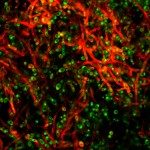Link to Pubmed [PMID] – 24131138
N. Engl. J. Med. 2013 Oct;369(18):1704-14
BACKGROUND: Deep dermatophytosis is a severe and sometimes life-threatening fungal infection caused by dermatophytes. It is characterized by extensive dermal and subcutaneous tissue invasion and by frequent dissemination to the lymph nodes and, occasionally, the central nervous system. The condition is different from common superficial dermatophyte infection and has been reported in patients with no known immunodeficiency. Patients are mostly from North African, consanguineous, multiplex families, which strongly suggests a mendelian genetic cause.
METHODS: We studied the clinical features of deep dermatophytosis in 17 patients with no known immunodeficiency from eight unrelated Tunisian, Algerian, and Moroccan families. Because CARD9 (caspase recruitment domain-containing protein 9) deficiency has been reported in an Iranian family with invasive fungal infections, we also sequenced CARD9 in the patients.
RESULTS: Four patients died, at 28, 29, 37, and 39 years of age, with clinically active deep dermatophytosis. No other severe infections, fungal or otherwise, were reported in the surviving patients, who ranged in age from 37 to 75 years. The 15 Algerian and Tunisian patients, from seven unrelated families, had a homozygous Q289X CARD9 allele, due to a founder effect. The 2 Moroccan siblings were homozygous for the R101C CARD9 allele. Both alleles are rare deleterious variants. The familial segregation of these alleles was consistent with autosomal recessive inheritance and complete clinical penetrance.
CONCLUSIONS: All the patients with deep dermatophytosis had autosomal recessive CARD9 deficiency. Deep dermatophytosis appears to be an important clinical manifestation of CARD9 deficiency. (Funded by Agence Nationale pour la Recherche and others.).

